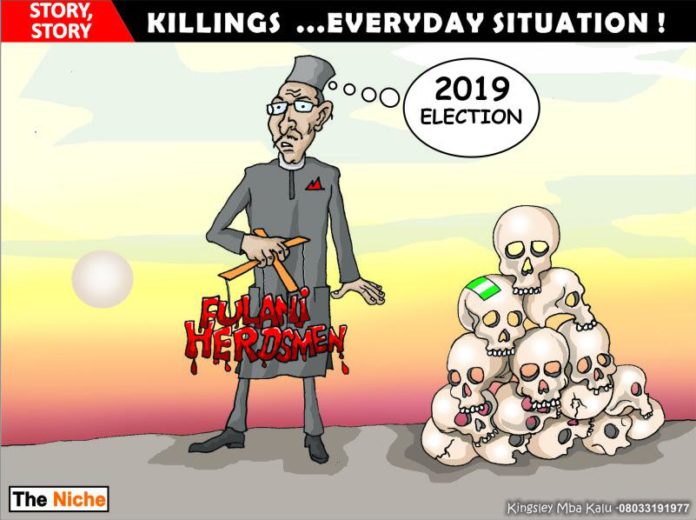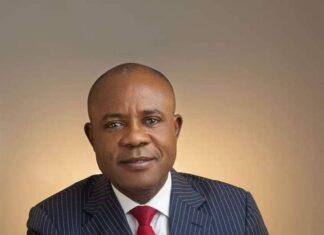The global outrage that greeted the recent carnage in Plateau State by suspected herdsmen is a proof that members of the international community may have decided to unshackle themselves from their lethargy and indifference to the horrendous bloodletting in Nigeria.
For too long, many agonising citizens had wondered whether the world abandoned them to their ugly fate.
On Sunday, June 24, Nigerians woke up to behold yet another gory spectacle of men, women and children hacked to death, some in their sleep, and their homes razed down in Barkin Ladi, Riyom, Mangu, Bokkos and Jos South Local Government Areas of Plateau State.
Many of the victims were simply burnt to death.
The Plateau killings was just an addition to what has become a regular diet of carnage across the country, which though not new, has intensified in the three and half years since General Muhammadu Buhari became president.
Though the Plateau State Police Command confirmed that 86 people of the Berom ethnic nationality were murdered in an orgy of violence, eye witness accounts sharply contradict that record, insisting the casualty figure may well be over 200.
Since then, the country has been on edge. It is one carnage too many.
Humanity was aghast at such bestiality just as President Buhari condemned the massacre, vowing that “no efforts will be spared to bring the perpetrators to justice, and prevent a recurrence/reprisal attacks.”
Insisting that the killings were painful and regrettable, the president vowed. “We will not rest until all murderers and criminal elements and their sponsors are incapacitated and brought to justice.”
Many Nigerians sneer, obviously unimpressed, with what seems to have become standard government sloganeering in the face of the country’s inexorable march to perdition.
The scorn stems from the perception that the Buhari government is not doing enough to stop the killings.
Reactions from home and abroad seem also to suggest that many world leaders are unimpressed with the government’s self-acclaimed efforts to pull back the country from damnation.
The Secretary General of the United Nations (UN), António Guterres, is one of such global leaders.
In a statement by his spokesman, Stéphane Dujarric, the UN scribe said all attacks targeting civilians violate international humanitarian law and expressed his deep concern “about the increasing frequency, intensity, complexity and geographic scope of violent conflict between farmers and herders, as well as related banditry, extortion and cattle rustling.”
The United States also strongly condemned the attacks.
In a statement by Heather Nauert, spokesperson for the U.S. department of state, the global superpower said the perpetrators of the attacks should be brought to justice.
“The United States condemns in the strongest possible terms the killing of civilians and destruction of property in Nigeria’s Middle Belt region,” the statement read.
Many Nigerians are worried that the government seems not to be bothered about the unprecedented loss of life, property and livelihoods, as well as population displacement.
Nobel laureate, Prof Wole Soyinka, said that much early this year when he asserted that killer herdsmen had declared war against Nigeria and urged President Buhari to halt their murderous activities without further delay and give those who are occupying lands that do not belong to them 48 hours to get out of there for the proper indigenous occupants to return to their homes.
And if the government is overwhelmed, Soyinka advised that it should seek international assistance.
The government has done neither, rather the president is playing victim while pointing fingers of blame at faceless political opponents.
As we write, over 52 villages and communities have reportedly been annexed by the invading herdsmen in four local government areas where the attacks took place. The situation is the same in Benue State, Southern Kaduna and other flashpoints.
When the horrendous internal dislocation is thrown into the mix, the enormity of the tragedy comes into sharp focus.
For instance, on Monday, July 9, The Plateau State Emergency Management Agency (SEMA) said 38,051 Internally Displaced Persons (IDPs) were now taking refuge in 31 camps in the state.
This number does not include 6,653 persons taking refuge in eight “host community” camps.
This is a calamity. But even more calamitous is the seeming aloofness and rationalisations of the government as Nigeria slowly but inexorably slides into the Hobbesian state of nature where life is short, nasty and brutish.
Most worrisome is the penchant of the government to point fingers of blame and accuse “detractors” rather than tackling the problem headlong, a re-enactment of the popular legend Nero who played the fiddle while Rome burned.
That is tantamount to playing politics with the destiny of the country.
The Federal Government’s penchant to change the narrative has not helped matters.
The government has blamed everything and everybody – soldiers of fortune from Libya, indigenous farming populations, climate change, anti-open grazing laws – for the crisis without mustering the courage to call a spade by its name, which is that the herdsmen who are carrying out these attacks are terrorists and must be treated as such.
When the presidency appeals to Nigerians and the international community to refrain from spreading false stories and inflammatory statements, the question left unanswered is; when will they give justice to the victims of these heinous crimes?
How can the government claim to be working hard in order to resolve the crisis when nobody is being punished and the annexed lands are still occupied by the invaders?
How can the Buhari government sincerely claim that it makes no distinction among the population and works tirelessly to protect all Nigerian people in the prevailing circumstance?
Many Nigerians believe that what is going on in the Middle Belt in the name of “farmers-herders clashes” is genocide with land grab as the ultimate goal. It is a deliberate attempt to conquer and occupy the people’s ancestral heritage.
The comment made by the president to the effect that only God can solve the security challenges in the country is also unbecoming of a nation’s commander-in-chief because prayers can never be a government policy to fight insurgency and insecurity.
No matter the spin the government puts on these killings, TheNiche believes that it has not done enough to stem the bloody tide.
Nigeria is bleeding and a government that came into office promising to secure the lives and property of the citizenry cannot continue serving the people a cocktail of excuses.
There can be no peace without justice.
If the government sincerely wishes to bring an end to this bloody conflict, perhaps, the first step should be a concerted effort to extricate all the ancestral lands and homes from the vice grip of the invading herdsmen.
As the Plateau lawmakers in the National Assembly noted, the magnitude and barbarity of the killings, destruction of homes and property that left hundreds of men, women, young, old, children and toddlers slain, should be a wake-up call to the government.
This is not a time to dither.
It is a bad omen for any country when a section feels that the indigenous population is being hunted and massacred with the government looking the other way.
This country has bled enough and the government must step up to the plate to stop this madness.













